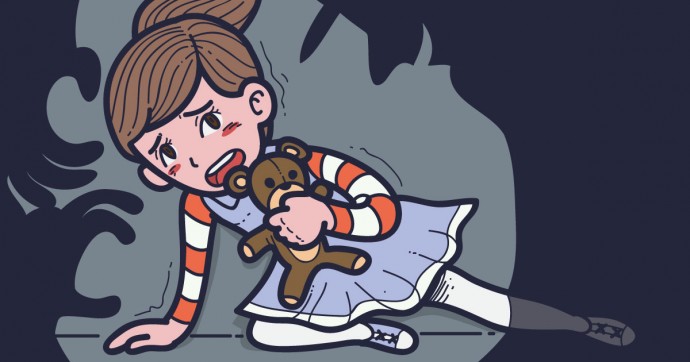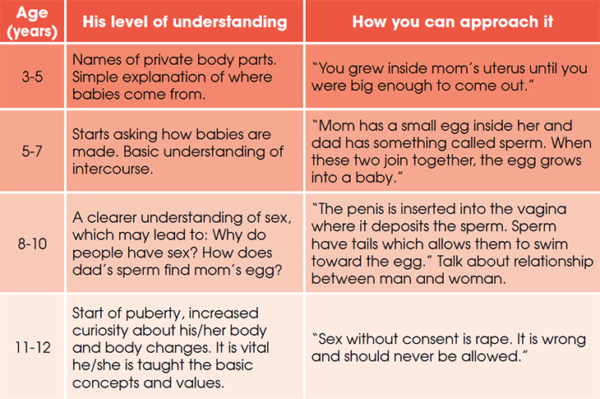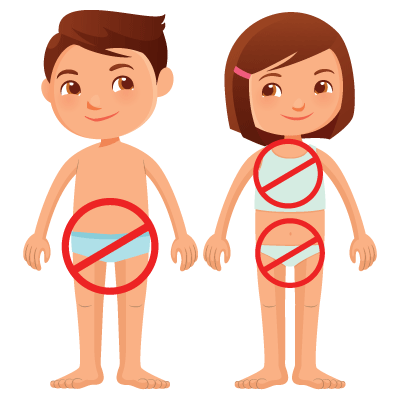There is no reason to get flustered over the idea of teaching kids about sex and sexuality.
As kids tend to live in the moment, answer any questions your child may have as soon as possible. The best time to start is in his/her pre-school years, particularly during daily routines such as bath times or when they are getting dressed to talk about body parts and safe touch.
Getting Started
Start by teaching simple things such as names of private parts and a simple explanation of where babies come from. Speak factually and use the correct names of private body parts (such as penis, vagina, and breasts) as young children tend to be very literal. You may have to describe what they do – the uterus is like a sac which keeps the baby safe inside.
Use appropriate language when describing reproductive acts and provide examples to aid his/her understanding. Injecting some humour into your talk is fine but don’t overdo it. Lastly, do not worry that you are giving him/her ‘too much’ information.
Guide to approach ‘the talk’ according to the child’s age
Preventing child sexual abuse
Child sex abuse has no boundaries so don’t be afraid to make this a part of your parenting conversation with your child. The actual number of sex abuse cases against children are not widely publicised (and possibly underreported), with some news agencies reporting ‘22,000 cases reported since 2010’ or ‘Over 5,000 cases in the last five years’.
Do not focus exclusively on ‘stranger danger’ as the perpetrator is likely someone (male or female) in the immediate family, another person in a position of trust (such as daycare staff or babysitter), or even possibly an older child.
Start by teaching your child about the right and wrong types of touch. Furthermore, empower him/her by teaching him/her to be assertive when faced with such a situation.
The Swimsuit Rule
“To teach safe touch, use the swimsuit rule as a guide – no one should be allowed to touch him/her in the covered areas. His/her mouth is also considered a private zone,” stresses Dr Rajini.
“Teach him/her not to allow touch or space intrusions that make him/her uncomfortable. Empower him/her to say NO – stress the importance of telling the person to stop. This should be followed by informing you about it. Reassure him/her that he/she is not in trouble as it is not his/her fault. Convince him/her that keeping it secret is not going to make it stop unless he/she reveals what happened regardless of the perpetrator’s threats to stay silent about it.”
Recognising signs of sexual abuse
Unfortunately, victims of child sexual abuse may feel afraid or humiliated to reveal their plight. Be alert for signs that indicate something is wrong.
Signs to look out for…
Dr Rajini advises parents to be alert for sudden behavioural and emotional changes:
- Unexplainable fearful and clingy behaviour, especially toddlers or young children.
- Reversion to behaviours that he/she has outgrown, such as bed-wetting, thumb-sucking, or not speaking properly (in young children/ toddlers).
- Fear of adults of a specific gender.
- Fear or aversion to physical touch or closeness to someone else.
- Abrupt unwillingness to go out or be with a particular person.
- Sudden unexplained changes in his/her personality.
- Display signs of depression and anxiety.
- Displays a level of sexual knowledge not appropriate for his/her age, especially if he/she has not been taught about it and is still not past puberty.
Physical signs of sexual abuse:
- Pain, discolouration, scrapes, bleeding, or discharges in his/her genitals, anus, or mouth.
- Persistent or recurring pain during urination and/or bowel movements.
- Wetting and/or soiling ‘accidents’ may occur (not connected to toilet training).
Speak with your child to try to determine what happened. Stay calm and keep things light and casual. If he/she confirms your suspicions that sexual abuse has occurred:
- Lodge a police report.
- Send him/her to any Government Hospitals for a check-up; if evidence of sexual abuse is found, the doctor will assist you in lodging a police report.
- Report the suspected sexual abuse to the nearest Social Welfare Department.
If you have any doubts after talking to your child, you can always consult with his/her paediatrician for advice on how to proceed.
Alternatively, you can contact the Women’s Aid Organisation (WAO) which offers emotional support, counselling or information on sexual assault, rape, child sexual abuse or incest at their Sexual Assault Helpline at 03-7960 3030 (Mon-Fri, 9am-5pm).
An educational contribution by Malaysian Paediatric Association.









Comments